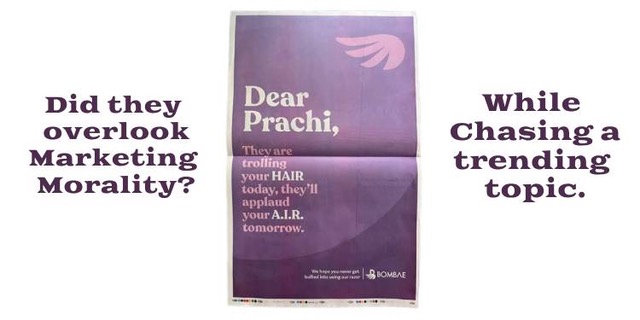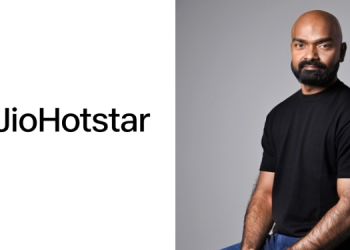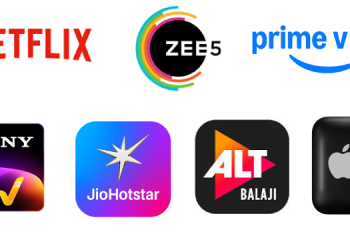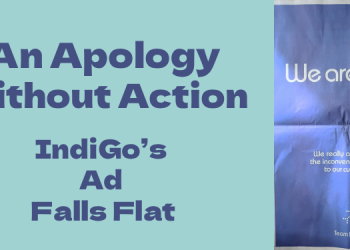Prachi Nigam of Uttar Pradesh gained widespread attention for achieving an impressive 98.5% in her Class 10 board exams. However, her academic success was marred by online trolls targeting her appearance, particularly her facial hair. In response to the ensuing social media outcry, Bombay Shaving Company released an advertisement featuring Nigam, which was met with strong disapproval from the netizens.
Moment marketing can be a powerful tool when executed considerately and sensitively. However, in the case of the Bombay Shaving Company’s advertisement featuring Prachi Nigam, the execution missed the mark which resulted in repercussion and criticism. The advertisement by the brand attempted to capitalize on a trending topic – Prachi Nigam’s exceptional academic achievement and the subsequent trolling she faced due to her facial hair. However, instead of offering support or empowerment, the ad by Bombay Shaving Company seemed to underestimate Prachi’s experience and reduce it to a marketing gimmick for the brand. By framing Prachi’s achievements as something to be applauded in the future, the advertisement implied that her current struggles with trolling were insignificant in comparison. This contemptuous tone not only diluted the seriousness of cyberbullying but also failed to acknowledge the harm caused by body shaming and societal pressure to conform to narrow standards of beauty. Furthermore, the issue was compounded more by using Prachi’s image without her consent which raised the questions about ethics and consent in advertising. In a time when online privacy and consent are hot topic of discussions, using someone’s image without permission that too in an ad for a national print media can be seen as exploitative and discourteous.
The public response to the advertisement was swift and overwhelmingly negative. Social media platforms were flooded with criticism, accusing the brand of insensitivity and opportunism. Many called for a boycott of Bombay Shaving Company products, citing the ad as evidence of the brand’s lack of empathy and integrity.
Prita Bali, Content Editor at Pocket FM wrote, “Jumping on to the trend to stay relevant, climbing on to that algorithm ship because you need to sail is also cheap. Let’s please stop this now! The makers have realised and received enough backlash and I really don’t care about them but writing this for the little girl. Look, what a big mess you’ve made out of some excess hair on a woman! She’s gonna remember this for the rest of her life. Please stop this nonsense. Enough is enough! Be human. Stop scarring people for lives.”
Harkish Pandey of Nirvasa Healthcare wrote, “The actions of #Bombay #Shaving #Company speak for themselves, but circulating images of the company’s post featuring a young girl on LinkedIn is just as wrong. Jumping on trends for relevance and algorithm attention is cheap. It’s time to stop. The backlash has been enough for the makers, but let’s think about the impact on the young girl. This whole situation over some excess hair on a woman has gone too far.
Let’s #stop this nonsense and be more humane. Enough is enough.”
Another LinkedIn user named Chaitanya Praveen wrote, “The recent Bombay shaving cream ad is testament to how shameless and heartless certain advertising campaigns have become in face of relentless competition and deserted landscape of new ideas. Unsurprisingly, the company’s founder has justified it by taking a moralistic grandstanding accusing others of misogyny. Like many movements across the world, moral grand standings are increasingly used by the corporate sector while the usuals just buy into the feel-good narratives. I hope they have taken the 16 year old girl’s permission, if not, I hope she sues the company for such nonsense.”
Sahil Shah of Schbang wrote, “Bombay Shaving Company You continue to dig deeper and deeper by defending yourself. Just take the L guys, say sorry and move on. That poor girl doesn’t need the limelight and your product is good enough to sell without using her.”
A X user wrote, “Why not just set up a scholarship fund for the girl with a half of the money invested into this lame print ad and not even Tom Tom about it? That would be true compassion & empathy. But alas! the brand does not benefit from it.”
Why not just set up a scholarship fund for the girl with a half of the money invested into this lame print ad and not even Tom Tom about it?
That would be true compassion & empathy.
But alas! the brand does not benefit from it. #Fail #bombae #bombayshavingcompany— invertedmoron (@invertedmoron) April 27, 2024
Responding to the backlashes, Shantanu Deshpande, Founder CEO at Bombay Shaving Company wrote, “It was shocking to see the amount of hate targeted at a teenage girl who had TOPPED AN EXAM because of her facial hair. Our simple message to this amazing young woman with such a bright future. ❤️ Love to see my team ooze class. No opportunistic sale, QR code, nothing. Just a heartfelt message to a fellow Bae.”
The backlash against the brand highlights the deeper issue of misogyny that brands sometimes carry in their marketing strategies. This incident underscores the need for brands to examine their marketing practices or strategies through a lens of gender sensitivity and social responsibility. Instead of capitalizing on women’s struggles for profit or using their experiences as mere marketing fodder, brands should strive to empower and uplift women in their campaigns. We have seen examples like Tanishq’s #RemarriageWins, Whisper’s #TouchThePickle, Google India’s #WomenWill etc. Going forward, brands must prioritize inclusivity, respect, and empathy in their marketing efforts to foster a more positive and reasonable social environment. However, Bombay Shaving Company’s misstep serves as a cautionary tale for brands looking to capitalize on trending topics without considering the human impact of their actions.

















